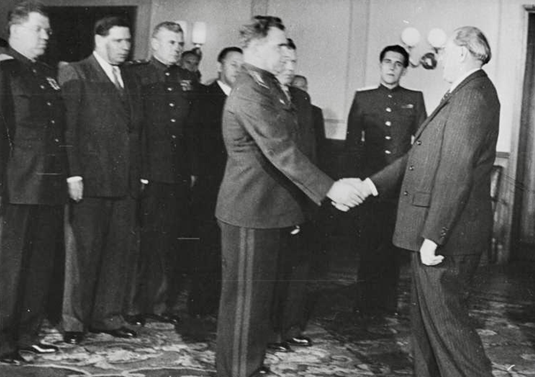An Authentically Decisive Leader in Post-War Germany
- Maria A. Kithcart

- Oct 16, 2024
- 3 min read
Updated: Feb 9
Pictured: Marshal V.I. Chuikov (center) during one of his visits to the GDR, 1974. He was awarded the first class gold version of the Combat Order ‘For Services to People and Fatherland” (the second class silver version is shown for detail).
Marshal Vasily Ivanovich Chuikov, a key figure in the post-World War II Soviet military, held dual leadership roles in the German Democratic Republic (GDR) that shaped both his leadership style and his legacy. As Chair of the Soviet Control Commission (SKK) and Commander-in-Chief of the Group of Soviet Forces in Germany, Chuikov’s influence spanned both political and military spheres. His leadership style, often seen as blunt and forceful, was rooted in the complex and high-pressure environment in which he operated, as illustrated in an anecdote shared by his adjutant, Vasily Bryukhov, during an interview with journalist Evgeniy Zhirnov for the Kommersant Vlast magazine.
Bryukhov’s account sheds light on Chuikov's direct and decisive methods, which were essential in managing the logistical challenges of resettling populations and establishing military infrastructure. This anecdote offers a glimpse into the broader responsibilities Chuikov carried—responsibilities that extended far beyond military strategy and required a nuanced approach to leadership in the volatile postwar landscape.
“‘It was just at that time that the GDR army was being created,’ Vasily Bryukhov, Chuikov's adjutant, told me. ‘We traveled a lot then. The GDR Ministers of Finance, Defense, and Agriculture traveled with the Commander-in-Chief [Chuikov]. He treated them like a master. The reconnaissance group went ahead. And we followed, by train, in three carriages. We had to find places to house new units, training grounds, and everything necessary. We inspected the site for the training ground. And there, in one place, was a peasant's house, in another, two.
Chuikov looked at the map and said to the Minister of Defense: We need to resettle them! He agreed: Yes, yes. Chuikov asked the Minister of Agriculture: Will you find a new place for them? He also said: Yes, yes. He turned to the Minister of Finance: Will you find money for the resettlement? And this one yaks. Chuikov says: The decision has been made, let's move on. That's how he solved all the problems without consulting anyone.”
In reflecting on this anecdote, it is essential to recognize that Vasily Ivanovich held not just one, but two significant leadership roles simultaneously in the GDR. This dual responsibility added layers of complexity to his decision-making processes, often requiring him to make swift, calculated choices regularly. In consideration of Chuikov’s character and the environment in which he operated, it becomes evident that his reputation as a ‘bull in a china shop’ oversimplifies his leadership approach.
To fully understand his behavior, we must examine the various life experiences that shaped him. His leadership role extended far beyond the battlefield. As someone tasked with overseeing a large contingent of troops outside the Soviet Union, Chuikov bore the weight of immense logistical and security concerns. National security was a constant priority, especially in the tense geopolitical climate of the Cold War. His role also included ensuring that his troops were well taken care of—this meant not only preparing them for potential military engagements but also securing appropriate living conditions for them and their families. This comprehensive focus on both the military and human aspects of leadership is crucial to understanding the breadth of his responsibilities.
While his abrupt decision-making style may have appeared brash, it often stemmed from the need to act decisively in high-pressure situations where delay could lead to serious consequences. In his position, safeguarding the well-being of those under his command and maintaining the delicate balance of power required a unique blend of firmness, pragmatism, and empathy. Viewing Chuikov’s actions within the broader context of his dual leadership roles provides a more nuanced understanding of the rationale behind his often forceful approach.




